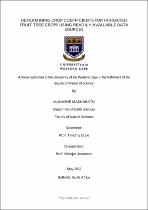Determining crop coefficients for irrigated fruit tree crops using readily available data sources
Abstract
The climate variability and climate change-induced events experienced worldwide have caused a significant decrease in the rainfall volume. South Africa is considered to be one of the driest countries in the world, as it receives an average annual rainfall that is lower than the global annual average. To sustain and grow the agricultural sector, South Africa supplements the low rainfall with its freshwater resources, for irrigation purposes. This action is necessary, especially for meeting the high water requirements of the South African fruit industry, as it is one of the major exporters of fruit in the world. Research has been conducted in an attempt to accurately quantify the water requirements of various fruits, which will assist farmers to save water, to increase their productivity and to managing their irrigation water. However, a knowledge of the water use, actual water consumption rates and the factors that drive them, is minimal and inadequate, and this has had a detrimental effect on the effective management of irrigation water and water allocation by the responsible stakeholders.

